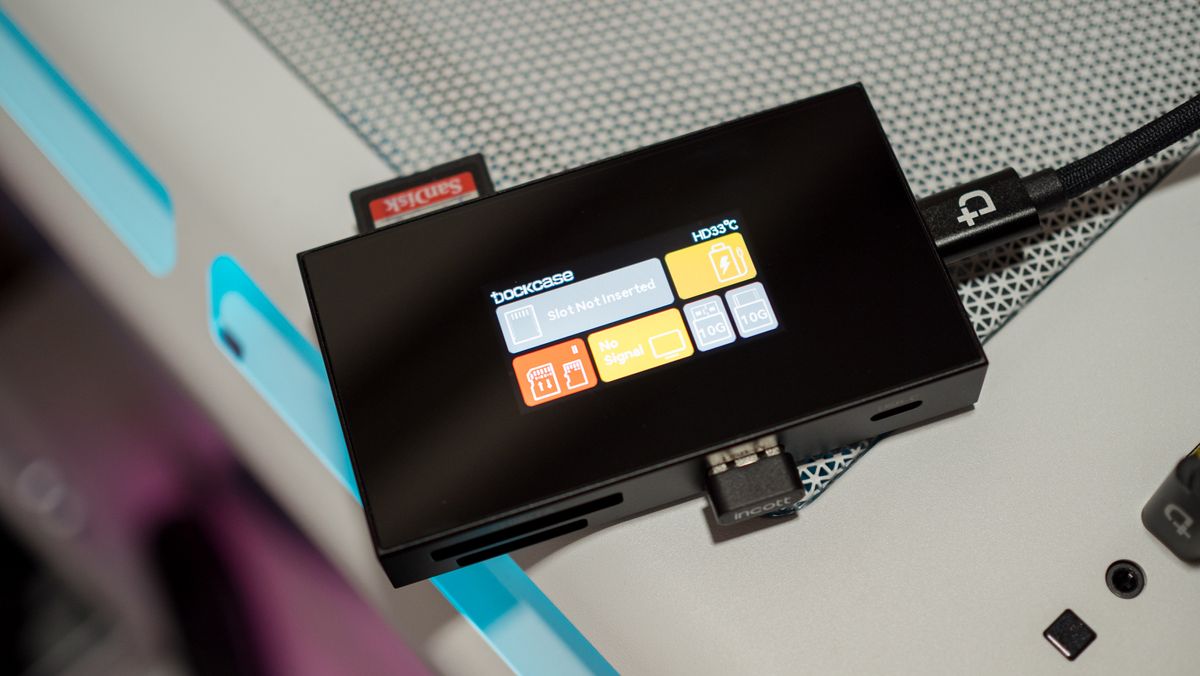My motherboard has 14 USB ports, but I’m still constantly running out of ports to plug things into, so I use a hub to manage auxiliary connections. These days, I have a Revodok Max 213 docking station connected to my machine, but I also use a portable dock mostly as a card reader, and that’s where Dockcase’s offering comes into the picture.
Dockcase managed to carve out a niche in this segment on the back of innovative designs, and its latest product is the Studio, an 8-in-1 USB-C hub. The Studio is being crowdfunded on Kickstarter at the moment, and you can get your hands on the USB-C hub for $139. The retail price is set at $199, so you’re saving $60 by backing the project right now.
Dockcase generally does a great job with the design of its hubs and docking stations, and that’s no different with the Studio. The hub is made out of aluminum, and has a good heft to it. It has a grooved design at the bottom that ensures it stays planted on a desk, and it is small enough that you can easily carry it in a bag.
The chassis has a matte texture, but the top features a glossy coat, and it picks up smudges very easily. This is where you get the screen, and it is a unique addition; you can view all connected accessories, and it will show real-time stats — charging details, bandwidth, and so on.
The hub draws power via the USB-C host port, so it doesn’t need any external power source. Dockcase bundles a carrying case with the Studio, but as I got an early testing unit, that wasn’t included in the package. On that note, the only issue I have in this area is that the bundled 100W PD cable is short; Dockcase needs to start offering at least a 1m cable as standard.
The Studio is clearly aimed at content creators, as it has a unique selection of ports that’s very different to what you get on every other USB-C hub. You get the standard card reader slots for SD and MicroSD cards, but then there are dedicated slots for CFExpress-A and CFExpress-B cards.
That leaves just four regular ports, and you get one USB-A, one HDMI, and two USB-C connectors — a standard port and a PD option that provides up to 100W of power. It didn’t have any issues charging the likes of the Pixel 8a and POCO F6, but the biggest issue with the hub is that you just don’t get anywhere as many ports as other options in this category.
It would have been much better to get at least another USB-C or USB-A port, because as it stands, you don’t get the ability to connect as many accessories to the Studio. Obviously, the advantage is that you can slot in just about any external memory card, so if you take a lot of photos and videos and use CFExpress in conjunction with SD cards, the Studio is a no-brainer.
I didn’t see any problems in daily use; the Studio delivered the same reliable transfer rates as other docking stations when using an SD card. All USB ports are based on the USB 3.2 Gen 1 standard and deliver 5Gbps bandwidth, and I was able to maximize the bandwidth when connecting an external SSD to the hub.
Navigating the screen is straightforward; you use gestures to dive in and out of menus, and because it uses a basic interface, there is some lag. You don’t get any confirmation message when you change a setting either, and you’ll need to power cycle the hub to see if the changes are present. A big part of the Studio’s differentiation is the screen, and it also contributes to the cost — even at $139, it is significantly costlier than most USB-C hubs you can buy today.
That said, if you need a hub with a sturdy design and want CFExpress alongside MicroSD/SD card slots, the Studio is a great choice.
